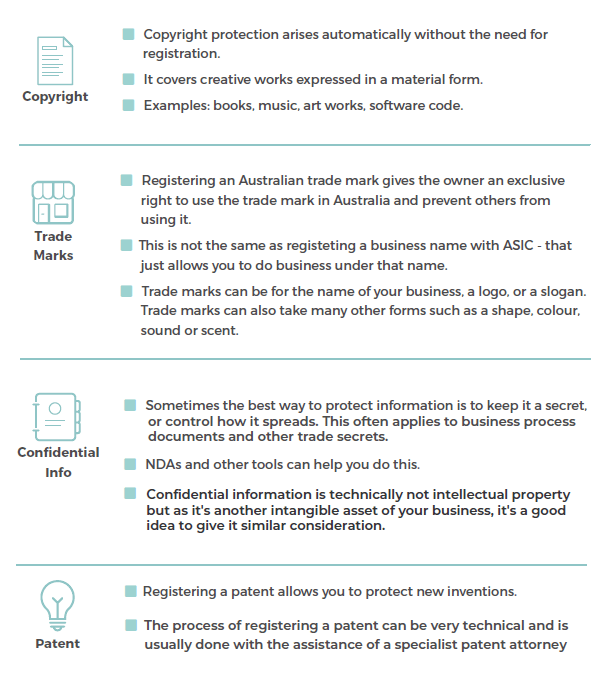CHAPTER 6
Intellectual Property

Chapter 1 – Getting Started With Your Legals
Chapter 2 – Business Ideas and Plans
Chapter 3 – Business Structure
Chapter 4 – Business Partners
Chapter 5 – Industry Regulations
Chapter 6 – Intellectual Property
Chapter 7 – Contracts
Chapter 8 – Finance
Chapter 9 – Building a Team: Employees and Contractors
Chapter 10 – Online Business & Privacy
Conclusion
This is a long chapter – but a very important one! Understanding Intellectual Property (IP), and how to protect it, is one of the biggest ways to ensure business success and longevity.
IP stands for Intellectual Property. It refers to the various rights to do with ownership of intangible property. IP is often one of the most valuable aspects of the business, especially for innovative businesses that capitalise on their smarts. This is because IP is the thing that makes your business unique and differentiates it from your competitors.
The most common types of intellectual property are:

There are some other types of IP too, such as designs and plant breeders rights. You can speak to a lawyer to help you figure out which types of IP protection you need.
There are 3 main ways to protect your IP as a small business.
Ensuring that contracts you sign contain appropriate intellectual property and confidentiality clauses is a crucial aspect of protecting your business IP.
You’ve put a lot of hard work and creative thinking into your business – and so whenever someone comes into contact with any of your IP or confidential information, you don’t want the risk that they could take it and claim it as their own! That said, you can’t keep everything a secret or you won’t be able to meaningfully work with anyone else.
Having well drafted contracts with your employees, contractors, service providers, suppliers, customers – basically anyone that comes into contact with your business – is an important safeguard. It can be hard to know exactly how to word it, but having a lawyer draft these contracts, giving particular attention to the IP and confidentiality provisions specific to your business, will give you that peace of mind.
An IP Assignment Deed is a legal document that transfers ownership of the IP created by one person to someone else.
For example, imagine you run an app company and hire a software developer to write the software code for your app. By default, the software developer will own the copyright in the code they create. But as the app company, you’d want to have full ownership of that code so that you can use it in everything you do with your app. You can get the software developer to sign an IP Assignment Deed so that the IP in the code belongs to your company.
If you’re engaging in confidential commercial discussions, you can also use an NDA or a confidentiality agreement. If other parties sign this legal document, they are prohibited from dispersing or using confidential information you share during your discussions.
Registering your business name and logo as a trade mark is a key way to protect your business’s brand, image and reputation. Registration gives the business exclusive use of the trade mark for certain goods and services. If you don’t register a trade mark, someone may come in with a very similar name or logo and prevent you from using yours.
If it is very early days for the business it might seem too soon to consider, but as the business becomes established it will become increasingly more important to register the trade mark. An easy way to check trade mark availability is by using IPONZ’s free checking tool. The tool will give you an indication if there are already trade marks that might be similar to your proposed brand or name – from there it’s a simple process to complete the application to register your trade mark.
It takes at least 6 months to register a trade mark in New Zealand, sometimes longer. It is possible to apply for a trade mark by yourself – see here for more information. However, some can find the process confusing to figure out and you may prefer a lawyer to help guide you through your application.
Registering a patent is a way to give you exclusive commercial rights to your invention (a monopoly). The process of registering a patent can be very technical, and it is normally a good idea to seek expert advice.
The type of patent you hold will determine the duration of your protection.
For more information on registering a patent in New Zealand, visit IPONZ.
In this chapter, we’ve learned about the different types of IP and how to protect them so that they are adding value to your business. It’s a lot to consider – if you’re not sure you’re making the right choices, you’re welcome to contact us and ask about how we can help!
Chapter 1 – Getting Started With Your Legals
Chapter 2 – Business Ideas and Plans
Chapter 3 – Business Structure
Chapter 4 – Business Partners
Chapter 5 – Industry Regulations
Chapter 6 – Intellectual Property
Chapter 7 – Contracts
Chapter 8 – Finance
Chapter 9 – Building a Team: Employees and Contractors
Chapter 10 – Online Business & Privacy
Conclusion
Tell us about your legal issue and we’ll put together a fixed fee quote for you.
Hi there!
You're visiting Sprintlaw . Would you like to switch to Sprintlaw ?
 Previous
Previous